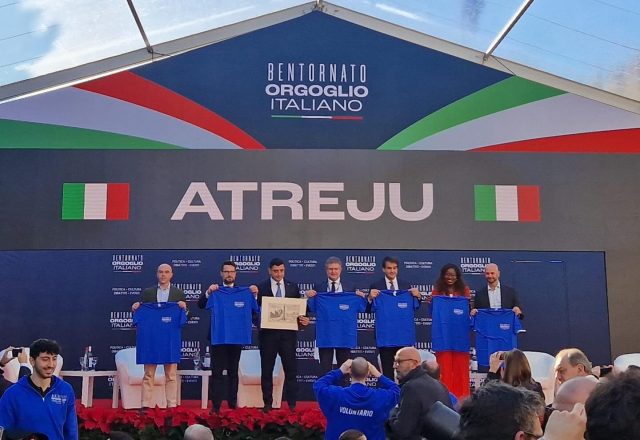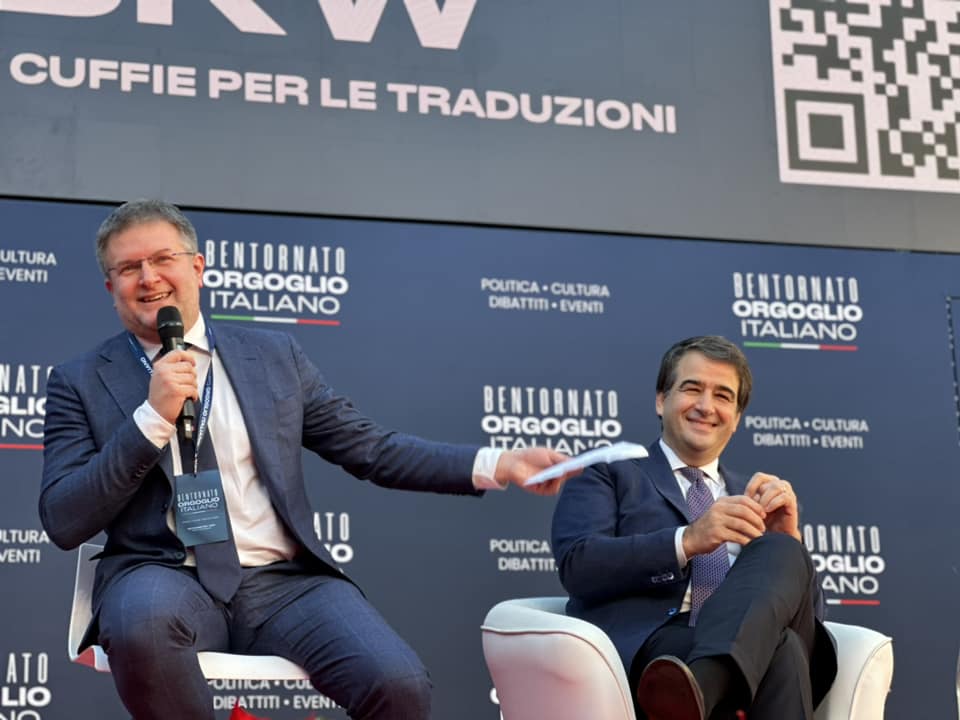
The ECR protagonist in Atreju
Atreju, the Fratelli d’Italia (ECR) event featuring debates on key topics of current political affairs was recently concluded. There was ample space for European and international issues, especially given the electoral date of 9 June 2024.
Particularly important was the panel entitled “Europe to defend: the reasons of the conservatives against the European superstate” with several high-sounding names among the protagonists: the Italian Minister of European Affairs Raffaele Fitto (FdI, ECR), the MEPs Jorge Buxadé (Vox, ECR), Carlo Fidanza (FdI, ECR), Assita Kanko (N-VA, ECR) and Nicola Procaccini (FdI, ECR), the Polish parliamentarian Radosław Fogiel (PiS, ECR) and the Romanian parliamentarian George Simion (AUR ).
 Carlo Fidanza played the role of moderator, anticipating however how Giorgia Meloni based the entire event on the great work at an international level, starting from the three great international guests such as Elon Musk, Edi Rama (PSSH, S&D) and Rishi Sunak (Tory), demonstrating that he maintains a clear line of ideas while engaging with everyone with an eye firmly on the future.
Carlo Fidanza played the role of moderator, anticipating however how Giorgia Meloni based the entire event on the great work at an international level, starting from the three great international guests such as Elon Musk, Edi Rama (PSSH, S&D) and Rishi Sunak (Tory), demonstrating that he maintains a clear line of ideas while engaging with everyone with an eye firmly on the future.
The various guests then spoke, underlining on the one hand the experience they had in their countries of origin and then developing the theme at a European level. Jorge Buxadé opened his speech by talking about the new Sánchez Government resulting from the post-election agreements: “A government that is a danger not only for Spain but also for Europe. The model proposed by Sánchez is a model that they will also try to bring to a community level, with a front of socialists and communists reinforced by part of the center-right. The Partido Popular (PPE) is not giving the same answers as us on the common good, on the defense of security, on the fight against illegal immigration, on the fight against lobbies and large multinationals, and having two distinct right-wing parties inevitably leads the left to unite”. “We must understand – concluded Buxadé – that for us national and European identity is a necessary starting point to reach the goal of taking control of Europe. For them, however, the starting point is to take control of a European Superstate, then build an identity to cement that control.”
Fogiel adds to the matter by recalling how the Polish conservatives of PiS were, together with the British conservatives, the founders of the ECR: “Before us, every right-wing party or movement had the only possibility of weighing in the European Parliament on entry into the PPE. They called us crazy for wanting to break the status quo, today we are here and we are among the largest European parties. I believe that we will grow further and be the second group after June 9th because we are the only group providing solutions to the great European crises, such as immigration. We will be a strong group because in many countries, such as in Italy and Poland, the ECR parties will be the first national parties.”
Also very important was the voice of Assita Kanko who clearly described how there is a fight for human rights even from the Right: “For the left, there are no right-wing women and there are no right-wing black people, instead there are many who they think like us because for us this is discrimination. We consider ourselves all people who want a good life and fair taxation that doesn’t make us pay for life for those who don’t want to work. As a woman and a mother I can only fight against woke ideology and radical Islamism, I must fight against those who would like to take away my freedom to be who I am.” Kanko also cited the example of the Belgian far left’s proposal to allow the Islamic headscarf even for 8-year-old girls: “I find this shameful and the fact that no European left says anything about it testifies to their attempt to curry favor with the Muslim Brotherhood. I want my children to live in Europe protected by Giorgia Meloni and not led by the Muslim Brotherhood!”.
“This event is entitled ‘Welcome back to Italian pride’. You are rightly proud to be Italian, we are proud to be Romanian, together we must be proud of our civilization, which is Latin and Christian” is the incipit of George Simion’s speech. “Our Europe is full of wealth and beauty, the roots lie right here in Rome, and see the need for a different European Union. Our leader is not Romano Prodi, he is not Enrico Letta, he is not Elly Schlein, he is not Franz Timmermans, he is not Ursula von der Leyen, but he is Giorgia Meloni, with whom we want to create a center-right government in Brussels, without giving up on the issues that are dear to us and winning the battles that we will encounter before us”.
MEP Nicola Procaccini then spoke, giving the example of the “conservative revolution” that started in Italy on 25 September 2022, when the Center-Right led by the Brothers of Italy won the Italian political elections: “On 9 June 2024 there will be a confrontation between two models of Europe. On the one hand, ours, is the result of the Treaty of Rome which was voted by everyone except the socialists and communists, which sees an alliance between free and sovereign nations, which have found in an alliance the reason for being together after centuries of wars. On the other side, that of the Left, the federalist model of the United States of Europe, or a superstate. They want to erase national states, but Italy is not Alabama and Spain is not Iowa: ours are not states, they are nations. From here then begins our fight for the Europe of Homelands, to be defended from those who want a Soviet Union.”
The European challenge becomes even more important if we think of the many funds of the Next Generation EU: “We were among the first countries to review the PNRR, adapting it to new needs and anticipating the times” claims Minister Fitto. “Immigration and flexibility in resources were the two themes at the center of the European Council, where the Meloni Government’s proposals were listened to carefully. Europe today is incapable of understanding the needs and providing solutions: think that only after the Russian invasion of Ukraine did we realize what the European Right had been denouncing for some time, namely the limits of energy dependence and strategic autonomy”. A passage also on the proposals for the entry of Ukraine and the Balkan states into the European Union: “A broader Europe cannot be built with slogans, but we need to know and understand what happens in terms of governance and use of resources. The distinctive trait of Giorgia Meloni and the Italian and European Right is to talk to everyone and this is what we will do with a greater voice from 9 June 2024”.
A series of significant ideas to launch the challenge to a European structure that is no longer responding with capacity and concreteness to the needs of national peoples, a challenge for all conservatives to win.



 Subscribe
Subscribe